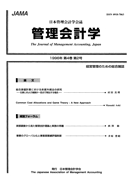
- Issue 2 Pages 3-
- Issue 1 Pages 3-
- |<
- <
- 1
- >
- >|
-
Mari Murata1996Volume 4Issue 2 Pages 3-27
Published: March 25, 1996
Released on J-STAGE: March 31, 2019
JOURNAL FREE ACCESSThe measurement method of non-neglecting spoilage and shrinkage in process costing is sometimes recommended for the purposes of cost management and precise product costing. But there are some problems within the framework of the method: Firstly, as we will learn by thinking about actual manufacturing processes, in many cases, some ending work-in-process passes the spoilage or shrinkage point, while others do not. Although ending work-in-process is commonly regarded as having existed widely through a process, the condition of ending work-in-process is represented by a single value of completion stage. Secondly, the conception of the completion stage to stand for the points at which spoilage and shrinkage incur respectively is confused with that which stands for their equivalent whole units. Thirdly, the distinction between spoilage and shrinkage is conceptualy cleared, but it is ambiguity from the point of view of costing.
The paper clarifies the nature and defects of the framework of the traditional method, and proposes the new measurement method of non-neglecting spoilage and shrinkage, solving those problems, on the situation that each normal spoilage and normal shrinkage arises at a certain point on a manufacturing process under FIFO process costing.
View full abstractDownload PDF (4420K) -
Masaaki Aoki1996Volume 4Issue 2 Pages 29-49
Published: March 25, 1996
Released on J-STAGE: March 31, 2019
JOURNAL FREE ACCESSSome game theoretical solutions (Shapley value, nucleolus, and so on) are proposed as allocation schemes in common costs allocation. Game theoretical solutions have desired properties compared with the conventional allocation scheme based on some allocation bases. Many authors consider that cooperative game solutions, which might be rather complex and difficult to formulate than the conventional method, become new allocation schemes. But it seems that the conventional allocation scheme is widespread in practice. A new approach to common costs allocation is proposed to examine this reason.
We examine three simple models under the proposed approach. They are formulated with the two-person game and describe the allocation practice appropriately. The results obtained from these models indicate that the conventional allocation method does not have serious problems in two models but have difficulties in one model. Whether the conventional allocation method has difficulties or not in the common costs allocation setting depends on the information each department has. Therefore it is important to identify the situation where the common costs allocation is necessary when the conventional allocation method is used as an allocation scheme.
View full abstractDownload PDF (3524K)
-
Osamu Nishizawa1996Volume 4Issue 2 Pages 51-66
Published: March 25, 1996
Released on J-STAGE: March 31, 2019
JOURNAL FREE ACCESSI conducted a questionnaire survey on the 227 items, covering all areas of management accounting to 1,000 leading Japanese corporations in the Autumn of 1994. I found the serious gap between theory and practice in management accounting as the result of analyzing the replies. There were replies which showed the probable contrary conditions between theory and practice.
Why does practice alienate from theory in management accounting and how should they reconcile?. My thesis challenges above problems. In this thesis I define and classify theory and practice and then study the relationship among them. As Alienation theory and Unification theory cannot be adapted in this case, I discuss how to reconcile from the viewpoint of Reconcilement theory.
First of all, in order to solve the alienation vs. reconcilement problems between theory and practice in management accounting, I pick up the main theme of Usefulness, especially Relevance. I classify them into three categories that is single relevance, duplicate relevance (devise it into relevance by business functions and by management levels) and relevance by environment countermeasures types. I study historically the reasons of alienation and the method of reconcilement through literatures from home and abroad in each of the categories and present the background of theoretical study. I disclose my real intention as well as the formal intention on them.
In the main part of the thesis, I show four hypotheses on the basis of above discussion and then illustrate each of them by the result from my questionnaire survey cited earlier. Lastly, I intend and conclude that the Japanese Association of Management Accounting need to play an important role in order to reconcile theory and practice in management accounting.
View full abstractDownload PDF (2895K) -
[in Japanese]1996Volume 4Issue 2 Pages 67-73
Published: March 25, 1996
Released on J-STAGE: March 31, 2019
JOURNAL FREE ACCESSDownload PDF (1323K)
- |<
- <
- 1
- >
- >|